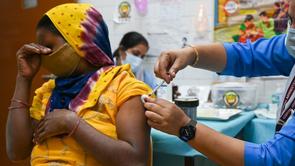 A health worker inoculates a woman with a dose of the Covaxin vaccine against the coronavirus at a health center in New Delhi on Oct 21, 2021. (PRAKASH SINGH / AFP)
A health worker inoculates a woman with a dose of the Covaxin vaccine against the coronavirus at a health center in New Delhi on Oct 21, 2021. (PRAKASH SINGH / AFP)
SYDNEY / ANKARA / YEREVAN / SINGAPORE / TEHRAN / YANGON / SUVA / TOKYO / KUALA LUMPUR / NEW DELHI / VIENTIANE / BANGKOK / SEOUL / ULAN BATOR / ISLAMABAD / MANILA - Covaxin, a vaccine developed by India’s medical research agency and Bharat Biotech International Ltd., was 77.8 percent effective at preventing symptomatic COVID-19 in an interim analysis of a long-awaited study.
Covaxin, which uses traditional, inactivated-virus technology, induced a robust antibody response two weeks after the second dose was given, the investigators concluded.
No severe adverse events or vaccine-related deaths occurred during the randomized trial involving 24,419 adults. The research, conducted between November 2020 and May 2021 in India, was published in The Lancet.
The interim analysis based on 130 laboratory-confirmed infections is in line with the company’s earlier efficacy and safety announcements and may help end the controversy surrounding the shot’s early authorization in January in India.
The study was funded by Bharat Biotech and the Indian Council of Medical Research, and researchers with both organizations participated in the work.
At the time of India’s approval, the shot hadn’t yet cleared its final-stage trials, prompting widespread hesitancy in the early weeks of the country’s immunization drive.
Since then more than 120 million doses of Covaxin have been deployed across India. Last week the World Health Organization added the inoculation to its list of COVID-19 vaccines authorized for emergency use.
In the study, 106 people given placebo and 24 who got the vaccine contracted the virus. Fiften on placebo developed a severe COVID-19 infection, compared with one given the vaccine, the researchers found.
The shot appeared 65 percent effective against the more infectious delta variant, though more work is needed to confirm the findings, they said.
Home to the world’s largest vaccine manufacturing industry, India had heavily promoted Covaxin. However the shot accounts for just over one out of 10 doses administered in the country of 1.4 billion people, with AstraZeneca Plc’s vaccine - made and known locally as Covishield - making up the lion’s share.
Covaxin is also being evaluated by India’s drug regulator for use in those aged 2 to 18, though the country has yet to start inoculating children against COVID-19.
Armenia
Armenia on Thursday declared to extend the nationwide COVID-19 quarantine to June 20, 2022 due to the current pandemic situation.
The quarantine regime, introduced in early 2020 to replace the state of emergency, allows the government to continue enforcing coercive measures such as social distancing, mask wearing and other anti-epidemic preventative rules.
Armenia on Thursday reported 1,482 new COVID-19 cases, taking its total to 325,521, according to the country's ministry of healthcare.
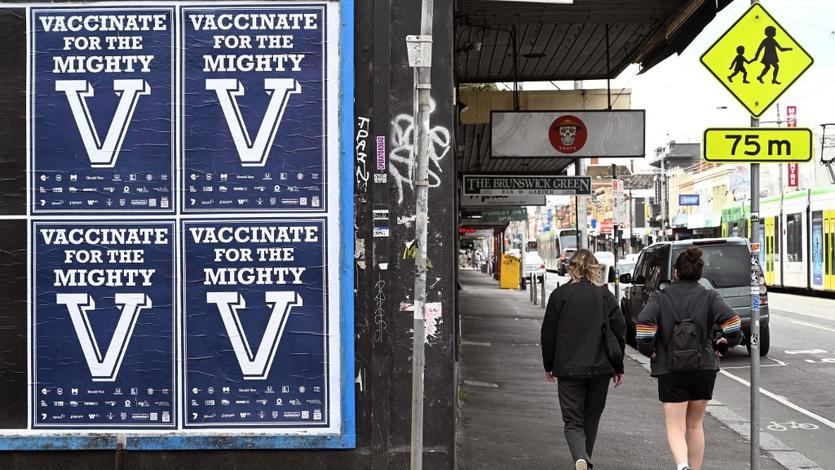 People walk past a sign encouraging people to get vaccinated in Melbourne on Aug 31, 2021 as the city experiences it's sixth lockdown as it battles an outbreak of the Delta variant of coronavirus. (WILLIAM WEST / AFP)
People walk past a sign encouraging people to get vaccinated in Melbourne on Aug 31, 2021 as the city experiences it's sixth lockdown as it battles an outbreak of the Delta variant of coronavirus. (WILLIAM WEST / AFP)
Australia
The Australian state of Victoria prepared to introduce vaccination mandates for construction industry workers.
The state reported 1,115 new locally acquired COVID-19 cases and nine deaths on Friday, while more than 86 percent of eligible Victorians have been double vaccinated.
Victoria chief health officer Brett Sutton issued a warning in a statement that several vaccination deadlines are "approaching", and all the Victorian construction workers must be fully vaccinated by Saturday to be eligible to continue working on site.
The second-dose deadline is also approaching for workers in Victoria's residential aged-care facilities, who must be fully vaccinated by next Monday.
Exceptions apply to workers with a medical exemption.
The Department of Health also noted a change to requirements for fully vaccinated international travelers and aircrew arriving in the state.
Upon arrival, travelers and crew must be tested for coronavirus within 24 hours. Anyone wanting to enter Victoria from overseas must obtain an international COVID-19 vaccination certificate, or proof of a medical exemption.
Additionally, travelers aged over 12 must have tested negative for COVID-19 no earlier than 72 hours before departure to Victoria and must have applied for an international passenger travel permit via Services Victoria.
Meanwhile, Australia has hit a new COVID-19 vaccine milestone, with 90 percent of adults having received one dose.
Prime Minister Scott Morrison on Friday confirmed that Australia passed the rollout milestone for those aged 16 and over.
He said that every state and territory was on track to hit 80 percent double dosed by the end of 2021, a mark already achieved in the Australian Capital Territory (ACT), Victoria and New South Wales, all of which endured strict lockdowns between August and October.
ALSO READ: Iran's COVID-19 caseload tops 6m
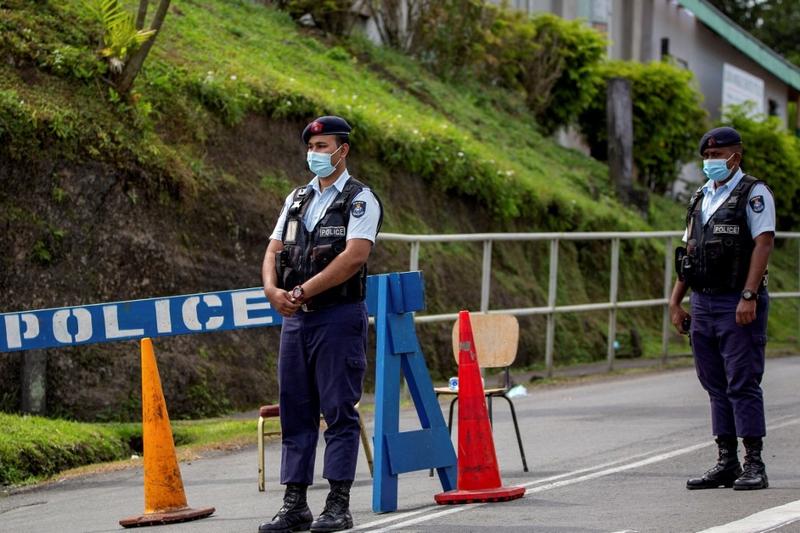 In this file photo taken on Aug 9, 2021, police officers keep watch at a security picket outside a vaccination center in Suva amid a rise in COVID-19 coronavirus cases in the Pacific nation. (LEON LORD / AFP)
In this file photo taken on Aug 9, 2021, police officers keep watch at a security picket outside a vaccination center in Suva amid a rise in COVID-19 coronavirus cases in the Pacific nation. (LEON LORD / AFP)
Fiji
Fiji's Ministry of Health on Friday said individuals can now travel to and from Viti Levu, Fiji's main island, to Vanua Levu and maritime islands under risk-reduction protocols.
Fiji's Permanent Secretary for Health James Fong said the overall vaccination coverage for Vanua Levu and all maritime islands is above 80 percent.
Fong said the quarantine requirement will be removed. However, travel will be limited to fully vaccinated persons. Passenger capacity on shipping vessels will be restricted and additional measures will be taken to ensure that all COVID-19 safe measures are stringently enforced.
Registration of passengers will no longer be required before traveling.
Maritime communities with less than 60 percent double dose vaccine coverage will be red zoned and highlighted for ongoing escalated community engagement, he said.
Red-zoned communities in maritime islands will be required to institute a seven-day quarantine protocol for incoming travelers subject to ongoing changes as advised by the ministry.
The ministry expects to fully vaccinate 90 percent of the eligible adult population by Saturday.
Fong said pending confirmation of the 90 percent threshold, the curfew hours will move to 12:00 am to 4:00 am local time from Sunday.
Iran
Iran's Health Ministry on Thursday reported 7,539 new COVID-19 cases, taking the country's total case count to 6,019,947.
The pandemic also claimed 123 lives in the past 24 hours, taking the overall tally to 127,809, said the update by Iran's Ministry of Health and Medical Education.
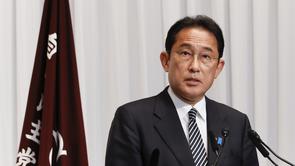 Japan's Prime Minister and Liberal Democratic Party leader Fumio Kishida, left, speaks during a news conference at the party headquarters in Tokyo, Nov 1, 2021. (RODRIGO REYES MARIN / POOL PHOTO VIA AP)
Japan's Prime Minister and Liberal Democratic Party leader Fumio Kishida, left, speaks during a news conference at the party headquarters in Tokyo, Nov 1, 2021. (RODRIGO REYES MARIN / POOL PHOTO VIA AP)
Japan
Japanese Prime Minister Fumio Kishida outlined on Friday an urgent plan to increase hospital beds and medical resources in preparation for a possible resurgence of COVID-19 infections this winter.
After a deadly fifth wave of infections almost overwhelmed the medical system during the summer, infections and deaths have fallen dramatically as vaccinations have increased to cover more than 70 percent of the population.
Emergency measures covering most of the country were lifted last month, but health experts warn that cases will likely rebound, as they did in Japan last winter.
Ahead of that, the government plans to boost hospital bed capacity by about 30 percent, bolster in-home care, and collect data to predict which hospitals will come under pressure.
"In parallel with strengthening the medical system, from December will use IT systems to make public the number of hospital beds and conditions at each hospital," Kishida told reporters.
Kishida said earlier this week that the "trump card" in the government's pandemic fight was the procurement of oral treatments that could prevent the need for hospitalization.
Japan will pay about $1.2 billion to Merck & Co Inc for 1.6 million courses of the COVID-19 antiviral pill molnupiravir, according to terms announced on Wednesday.
Meanwhile, vaccine booster shots are due to start from next month, and the government is considering expanding inoculations to children as young as five.
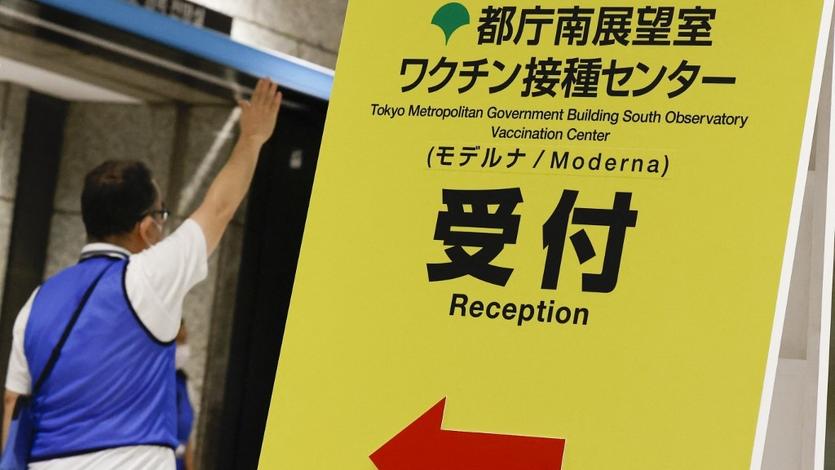 A signboard is displayed during a Moderna coronavirus vaccination campaign at the Tokyo Metropolitan Government building in Tokyo on June 25, 2021. (RODRIGO REYES MARIN / POOL / AFP)
A signboard is displayed during a Moderna coronavirus vaccination campaign at the Tokyo Metropolitan Government building in Tokyo on June 25, 2021. (RODRIGO REYES MARIN / POOL / AFP)
In another development, Takeda filed an application to obtain Japan approval for a third dose for Moderna’s vaccine, Nikkei reported, citing the Japanese drugmaker.
Japan’s Health Ministry on Thursday approved use of Pfizer vaccine for third shot.
Laos
The number of COVID-19 infections has risen to 52,175 in Laos after 1,198 new confirmed cases were reported in the past 24 hours, according to Lao Ministry of Health.
The National Taskforce Committee for COVID-19 Prevention and Control on Friday reported three imported COVID-19 cases and 1,195 new locally transmitted cases, according to the latest report by the Center of Information and Education for Health under the Lao Ministry of Health.
With one new death recorded in the pandemic, the COVID-19 death toll has risen to 94 on Friday, according to the report.
Malaysia
Malaysia reported another 6,323 new COVID-19 infections, as of midnight Thursday, bringing the national total to 2,528,821, according to the health ministry.
Twenty-five of the new cases are imported, with 6,298 being local transmissions, data released on the ministry's website showed.
Another 49 more deaths have been reported, bringing the death toll to 29,535.
Mongolia
Mongolia registered 875 new COVID-19 infections over the past 24 hours, bringing the national tally to 372,387, the country's health ministry said on Friday.
The latest confirmed cases were local infections, among whom 563 were reported in the national capital Ulan Bator, which is hardest hit by the outbreak.
Meanwhile, nine more people aged over 40 died from the viral disease in the past day, pushing the national death toll to 1,786, the ministry said.
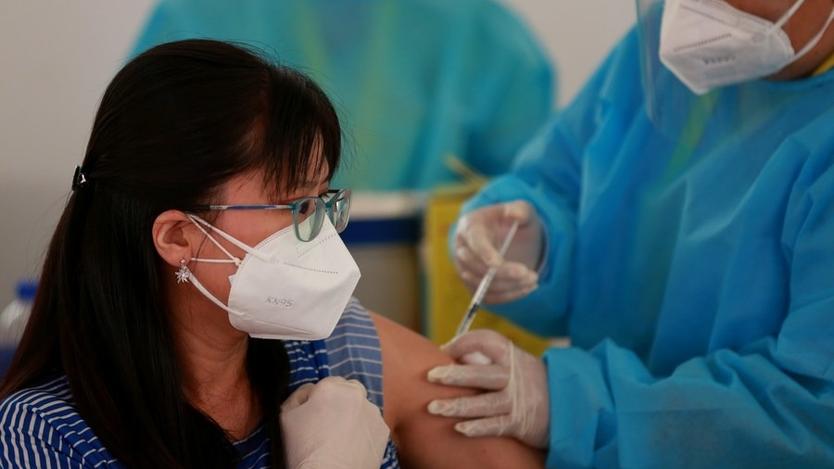 A woman receives a shot of China's Sinopharm COVID-19 vaccine in Yangon, Myanmar, Aug 29, 2021. (PHOTO / XINHUA)
A woman receives a shot of China's Sinopharm COVID-19 vaccine in Yangon, Myanmar, Aug 29, 2021. (PHOTO / XINHUA)
Myanmar
Myanmar's Health Ministry on Thursday announced lifting stay-at-home order in 17 more townships as fewer daily COVID-19 infections were detected.
The stay-at-home order will be removed in two townships of Yangon region and 15 townships of Mandalay, Bago, Magway, Ayeyarwady and Tanintharyi regions as well as Mon state starting Friday, the announcement said.
According to the ministry's figures, Myanmar reported 954 new COVID-19 cases, bringing the tally to 510,725 on Thursday.
The death toll has increased to 18,882 as of Thursday after 13 new deaths were reported in the past 24 hours.
ALSO READ: Vietnam's confirmed COVID-19 cases exceed 1m
Pakistan
Pakistan on Thursday reported 391 new COVID-19 cases and nine more deaths, the National Command and Operation Center (NCOC) said on Friday.
The NCOC said the country has conducted 21,318,930 tests so far confirming overall 1,279,142 cases, including 1,227,228 recovered cases.
Philippines
Philippines’ coronavirus task force approved measures to increase demand for vaccinations, effective Dec 1, Presidential Spokesman Harry Roque says in a statement.
In areas where there are sufficient vaccine supplies, vaccination of eligible employees tasked to do on-site work shall be required by all establishments and employers, according to a statement.
Employees who remain unvaccinated may not be terminated but shall be required to undergo regular RT-PCR testing, or antigen tests, at their own expense.
The Philippines' Department of Health (DOH) reported 1,894 new COVID-19 infections on Friday, pushing the number of confirmed cases in the Southeast Asian country to 2,813,115.
The DOH also reported that 170 more people died from COVID-19 complications, bringing the country's death toll to 45,035.
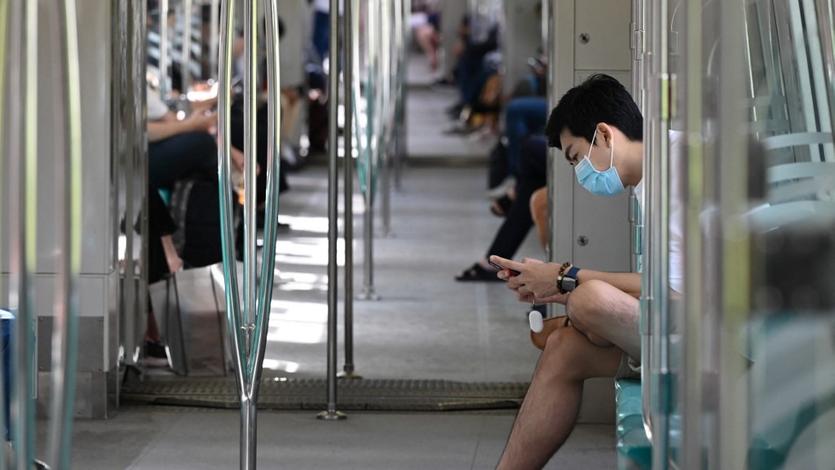 People wearing face masks ride on a mass rapid transit train in Singapore on Nov 5, 2021. (ROSLAN RAHMAN / AFP)
People wearing face masks ride on a mass rapid transit train in Singapore on Nov 5, 2021. (ROSLAN RAHMAN / AFP)
Singapore
Singapore’s COVID-19 patients who choose not to get vaccinated could face high medical bills.
In general, COVID-19 patients who need both care in intensive care units and therapeutics in hospitals may have to pay about S$25,000 ($18,460), according to a median estimate released by the health ministry on Thursday, in response to Bloomberg News queries.
Singapore reported 2,396 new cases of COVID-19 on Thursday, bringing the total tally in the country to 230,077.
Of the new cases, 2,243 were in the community, 136 were in migrant worker dormitories and 17 were imported cases, the Ministry of Health (MOH) said in a press release.
South Korea
South Korea reported 2,368 more cases of COVID-19 as of midnight Thursday compared to 24 hours ago, raising the total number of infections to 390,719.
The daily caseload was down from 2,520 in the previous day, but it hovered above 2,000 for three days.
The recent resurgence was attributable to cluster infections in the Seoul metropolitan area.
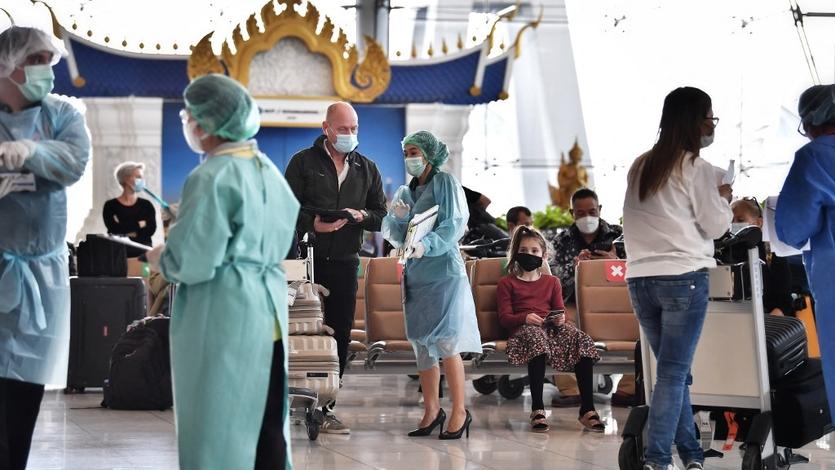 International visitors await instructions from health officials inside the arrival terminal at Suvarnabhumi International Airport as Thailand welcomes the first group of vaccinated tourists without quarantine in Bangkok on Nov 1, 2021. (LILLIAN SUWANRUMPHA / AFP)
International visitors await instructions from health officials inside the arrival terminal at Suvarnabhumi International Airport as Thailand welcomes the first group of vaccinated tourists without quarantine in Bangkok on Nov 1, 2021. (LILLIAN SUWANRUMPHA / AFP)
Thailand
The cumulative COVID-19 cases in Thailand surpassed 2 million on Friday, as the country recently lifted travel curbs to vaccinated international visitors in an effort to reboot its tourism-reliant economy.
With 7,305 new cases recorded in the past 24 hours, the total number of COVID-19 infections in Thailand stood at 2,004,274, according to the country's health ministry.
It has only been less than three months since the Southeast Asian country passed the 1-million mark in coronavirus cases in August. The months-long surge in infections has mainly been driven by the spread of the Delta variant.
However, the COVID-19 infection rates in the country have slowed since last month thanks to the ramped-up vaccination. According to the official data, nearly half of Thailand's 69-million population have been fully vaccinated against COVID-19 so far.
Meanwhile, bars, pubs, karaoke parlors and other night entertainment venues in Thailand will remain closed for at least another two months to prevent them from becoming new COVID-19 clusters.
A task force will be formed to prepare guidelines and standards for reopening of these venues, Taweesilp Visanuyothin, a spokesman for the Center for COVID-19 Situation Administration, says at briefing in Bangkok Friday.
Once they are deemed ready, they may be allowed to reopen from Jan 16 in popular tourist areas and those located outside the high-risk zones.
Turkey
Turkey on Thursday confirmed 24,898 new COVID-19 cases, raising its tally of infections to 8,340,322, according to its Health Ministry.
The death toll from the virus in Turkey rose by 197 to 72,910, while 24,360 more people recovered in the last 24 hours.


